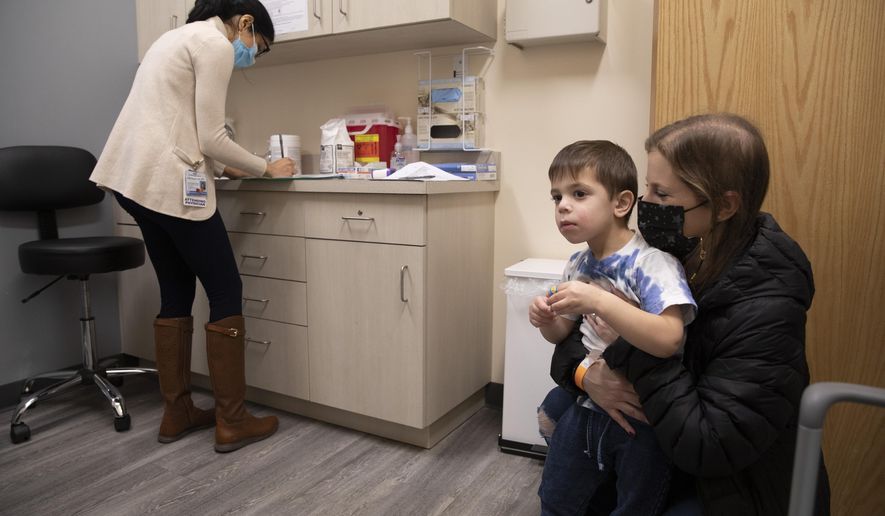A COVID-19 vaccine for the youngest children could be available by June as federal regulators line up a late-spring sprint to expand protection to all Americans.
The Food and Drug Administration will also have to decide if drugmakers should reformulate existing vaccines to target specific variants of the virus.
Dr. Peter Marks, director of the FDA’s Center for Biologics Evaluation and Research, said Friday the agency is setting aside five dates in June to work through it all with outside advisers.
Three of those meetings will be dedicated to getting a vaccine into the arms of those aged 5 and younger. Moderna recently submitted its application for a two-dose regimen for young children and Pfizer and BioNTech are expected to submit data on a three-dose course of its 5-and-under vaccine soon.
The twin applications raised fears the FDA would let the process drag out and evaluate the drugmakers at the same time.
Dr. Marks said that won’t be the case.
“We are not going to delay things unnecessarily here. This whole concept of delaying is not something we will be doing,” he told The Washington Post.
He said the vaccines could be evaluated by the FDA’s outside advisory panel on successive days if the drugmakers completed their data submissions within a week of each other. But they won’t try to package them together if there is a significant delay between applications.
If the drugmakers provide solid data on safety and efficacy, “we would anticipate June authorizations for one or more of the pediatric vaccinations,” Dr. Marks told the newspaper.
Also in the mix for FDA consideration is a brand-new vaccine from Novavax that would expand the U.S. vaccination campaign beyond the trinity of vaccines that have been offered for more than a year.
There are roughly 19 million U.S. children who are 5 or younger and remain the only persons ineligible for protection against severe COVID-19 disease through a vaccine.
Some parents are clamoring to get their children vaccinated and make summer plans. Polls show other parents are sanguine about the situation, figuring younger children tend not to see severe outcomes from COVID-19.
The FDA said it set aside meeting dates on June 8, 21 and 22 to discuss vaccines for young children with the Vaccines and Related Biological Products Advisory Committee as it waits for final submissions from Moderna and Pfizer.
It’s part of a busy slate for the advisers, who meet remotely but broadcast their meetings live on YouTube.
Dr. Marks said the panel on June 7 will consider an application for emergency use from Novavax, a Maryland-based company that developed a protein-based vaccine for COVID-19.
The two-dose vaccine was 90% effective against symptomatic infection in trials last year and received emergency authorization in other countries, though manufacturing delays have held it back until now. Like other drugmakers, the company is studying a third dose or a reformulation to deal with omicron.
The introduction of a new vaccine would be notable because the U.S. has been relying on a trio of vaccines since the start of the campaign in late 2020 and early 2021.
Pfizer and Moderna make messenger-RNA vaccines that use genetic code to teach the body to recognize and fight the virus. They are the dominant options.
Johnson & Johnson made a vaccine that uses an inactivated virus or adenovirus platform. Nearly 19 million J&J shots have been administered in the U.S.
Some people might be attracted to Novavax’s recombinant protein-based vaccine because they see it as a traditional, time-tested platform.
“We continue to hear from physicians, healthcare organizations, and consumers who are anxiously awaiting another vaccine option. We believe our vaccine, built on a well-understood protein-based vaccine platform, can play a part in fulfilling this need,” Novavax President and CEO Stanley C. Erck said.
Also Friday, Dr. Marks said the FDA will start to decide if COVID-19 vaccines should be modified to target certain variants and, if so, which strains should be selected for a potential booster campaign in fall 2022.
The advisory panel met earlier this month to plot a way forward and agreed they would have to make decisions about formulations by May or June.
“As we continue to address the ongoing COVID-19 pandemic, there are a number of anticipated submissions and scientific questions that will benefit from discussion with our advisory committee members,” Dr. Marks said. “We are providing a tentative schedule for discussion of these submissions, as these meetings will cover a number of topics that are of great interest to the general public. The agency is committed to a thorough and transparent process that considers the input of our independent advisors and provides insight into our review of the COVID-19 vaccines.”
For more information, visit The Washington Times COVID-19 resource page.
• Tom Howell Jr. can be reached at thowell@washingtontimes.com.




Please read our comment policy before commenting.